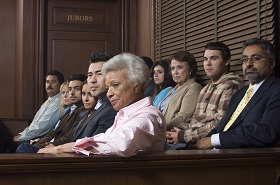The Seattle Personal Injury Blog
Posted Thursday, September 18, 2014 by
Chris Thayer
 In this article, a Seattle personal injury attorney addresses the issue of how to respond to two-part or misleading questions.
In this article, a Seattle personal injury attorney addresses the issue of how to respond to two-part or misleading questions.
Don’t Be Afraid to Request Clarification
If the meaning of a question is unclear to you, request that a more comprehensive explanation be given so that you understand fully what is being asked of you.
When Two Questions Seem Like One
Before you can attempt to answer a question that asks for more than one answer, you must separate them out. For example, suppose an attorney asks you if it was not until your first visit to the physician your attorney recommended that you became aware of the numbness in your left leg. This question is asking two different things. The first asks for a confirmation that your lawyer recommended a physician to you. The second concerns your symptoms. To answer the question clearly, you must address each part individually.
Beware of Questions Designed to Trap You
The old “are you still abusing your spouse?” is a prime example. If you answer “yes,” you’ve admitted to spousal abuse and are indicating that it’s still going on. If you answer “no,” then you’ve admitted to the abuse in the past. Either way, you’re trapped. Your Seattle personal injury attorney can and very likely will raise an objection to this kind of trickery, but you may be commanded by the judge to respond anyway. The correct answer, of course, is that you’ve never abused your spouse in any way.
Misquotes
Counsel for the opposition could, during summarization of your testimony, twist your words in such a way as to change or cast doubt on the meaning of what you said. Pay close attention so that if you have been misquoted or your words slanted such that your original meaning is obscured, you will recognize it. Weigh carefully what you are hearing and inform your Seattle personal injury lawyer if you feel that you have not been quoted accurately.
Take Immediate Steps
For information, assistance or representation in your personal injury case, contact your Seattle personal injury attorney today. Call Chris Thayer at (206) 340-2008 now.
Permalink to this entry
Posted Tuesday, September 16, 2014 by
Chris Thayer
 It is very possible that your deposition may be taken via video conferencing. Your personal injury lawyer in Woodinville can provide you with valuable suggestions if this is the case.
It is very possible that your deposition may be taken via video conferencing. Your personal injury lawyer in Woodinville can provide you with valuable suggestions if this is the case.
Don’t Look Down
You must maintain direct eye contact with the camera, so keep your eyes focused on the lens in front of you as if you were speaking to a person sitting across from you. Your audience sees what the camera sees. Since the camera is focused on your face and not on the table at which you are seated, it cannot pick up the documents to which you are referring as you speak. All your audience sees is that you are looking down instead of at them. From their perspective you are avoiding eye contact with them. At best, their attention begins to wander. At worst, they begin to question whether you are ashamed or untruthful and they begin to doubt your testimony.
Listen to the Lawyer
In the same vein, keep your eyes focused on the lawyer currently questioning you whether it is your personal injury attorney in Woodinville or the counsel for the opposition. Bring all your awareness to what he or she is saying. If you attempt to read while the lawyer is asking you a question you could mistake the meaning. Distraction can only do you harm, so do not allow the paperwork in front of you to divert you from what is being said to you. Consult your documentation between questions if you feel the need but never when you are speaking or are being spoken to.
Talking to the Jury
Just as you would pay strict attention to your personal injury attorney in Woodinville, give equal attention to the jurors. Listen closely to whoever is questioning you, then direct your answer to the camera. Remember, you are not looking at a machine. You are looking into the eyes of your jury. These people deserve your attention and will notice any apparent lack of eye contact.
Call for Representation
Your personal injury lawyer in Woodinville has the experience and professionalism you need to develop and present your case. Call Chris Thayer at (206) 340-2008 today.
Permalink to this entry
Posted Thursday, September 11, 2014 by
Chris Thayer
If you have been curious about the potential value of your personal injury case, your Seattle personal injury lawyer may be able to help. Your personal injury attorney may be able to talk with you about ways that may negatively impair the value of your claim and the methods that you can employ to better recover your damages.
Permalink to this entry
Posted Friday, September 5, 2014 by
Chris Thayer
When presenting testimony to the judge, you should give honest and detailed descriptions of the pain and related medical symptoms you experience. In order to successfully answer any and all questions the judge may ask you, review the 10 tips outlined below. For more detailed information regarding your case, you should consult with a Seattle personal injury lawyer. Call 1 (866) 884-2417 for a free consultation today.
Permalink to this entry
Posted Thursday, August 28, 2014 by
Chris Thayer
It is not unusual for insurance companies to use adjustment companies, whether they are local  or national, to handle claims. A Michigan personal injury lawyer can tell you that these type of adjustment companies are not only conservative when it comes to figures but they rarely are authorized to settle. However, if your counsel is given a very low settlement offer from the company, your lawyer can ask to work directly with the insurance company. If the adjustment company doesn’t allow that, a Michigan personal injury attorney can tell you that your representation can file a suit and send a letter to the insurance company explaining the situation.
or national, to handle claims. A Michigan personal injury lawyer can tell you that these type of adjustment companies are not only conservative when it comes to figures but they rarely are authorized to settle. However, if your counsel is given a very low settlement offer from the company, your lawyer can ask to work directly with the insurance company. If the adjustment company doesn’t allow that, a Michigan personal injury attorney can tell you that your representation can file a suit and send a letter to the insurance company explaining the situation.
The One and Only Adjusters also use another tactic in which they say that they received your settlement demand, and, in an effort to save time, they will send their best offer. They also will say that it is their only offer. Before an adjuster makes an offer, a Michigan personal injury attorney can tell you that it is a good idea for your representation to inform the adjuster that a best offer is welcomed if it matches the settlement demand. If not, your representation should bring to the adjuster’s mind that, in personal injury cases, a best and only offer is considered arbitrating in bad faith. A Michigan personal injury lawyer can explain that your representation should also tell an adjuster that you wouldn’t look at that type of offer favorably.
Lowball OfferThe last tactic used by insurance carriers is what many attorneys would consider a two-time, lowball offer. This would be, for example, an adjuster offering $6,000 after a personal injury lawyer demands $25,000, hoping for a settlement of about $15,000. The personal injury attorney then counters with a $19,000 demand and the carrier returns an offer of $6,500. A Michigan personal injury attorney will tell you the best way to handle this situation is to file a lawsuit. Making offers like that signal to a client that the adjusters are not interested in settling.
Contact a Michigan Personal Injury Attorney for AssistanceInsurance carriers use many negotiating tactics in personal injury cases. If you were involved in an accident and you need legal advice, call Chris Thayer, a Michigan personal injury lawyer, at 206- 340-2008.
Permalink to this entry
 In this article, a Seattle personal injury attorney addresses the issue of how to respond to two-part or misleading questions.
In this article, a Seattle personal injury attorney addresses the issue of how to respond to two-part or misleading questions.
 It is very possible that your deposition may be taken via video conferencing. Your personal injury lawyer in Woodinville can provide you with valuable suggestions if this is the case.
It is very possible that your deposition may be taken via video conferencing. Your personal injury lawyer in Woodinville can provide you with valuable suggestions if this is the case. or national, to handle claims. A Michigan personal injury lawyer can tell you that these type of adjustment companies are not only conservative when it comes to figures but they rarely are authorized to settle. However, if your counsel is given a very low settlement offer from the company, your lawyer can ask to work directly with the insurance company. If the adjustment company doesn’t allow that, a Michigan personal injury attorney can tell you that your representation can file a suit and send a letter to the insurance company explaining the situation.
or national, to handle claims. A Michigan personal injury lawyer can tell you that these type of adjustment companies are not only conservative when it comes to figures but they rarely are authorized to settle. However, if your counsel is given a very low settlement offer from the company, your lawyer can ask to work directly with the insurance company. If the adjustment company doesn’t allow that, a Michigan personal injury attorney can tell you that your representation can file a suit and send a letter to the insurance company explaining the situation.